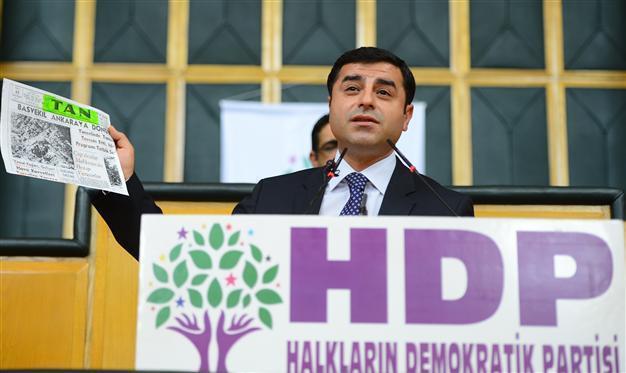HDP leader urges ‘state apology’ for Dersim massacre
ANKARA

AA Photo
Peoples’ Democratic Party (HDP) Co-Chair Selahattin Demirtaş has stepped into the ongoing debate over the massacre of thousands of people in the Eastern Anatolian province of Dersim, today called Tunceli, in 1937-38.
“The main opposition Republican People’s Party [CHP] is said to have offered an apology. What concerns the people of Dersim is an apology by the state. Whether you offer that apology together on behalf of the state, it’s your call,” Demirtaş said on Nov. 18.
Demirtaş took aim at the ruling Justice and Development Party (AKP) for politicizing the issue.
“Whenever they are in trouble, they take the Dersim massacre and Alevis onto their agenda,” he said. “As a matter of fact, they consider Alevism as a perverted sect and Alevis as people diverted from religion. They are obsessed with bringing Alevis to their knees. They do not and will not ever accept Alevis as an equal faith."
The debate over the Dersim massacres was sparked after CHP Deputy Chair Sezgin Tanrıkulu apologized for the tragic events in the predominantly Alevi-populated Dersim. In Dersim, now known as Tunceli, over 13,000 people were killed during a military operation to quash an apparent Kurdish tribal rebellion during the CHP’s single-party rule. Seyid Rıza, the leader of the movement, was executed in 1937.
Demirtaş suggested that the AKP government had no intention of resolving the Alevi people’s modern day grievances and was using the Dersim issue as a political decoy.
“When they [the government] say ‘We will resolve the Alevi issue, they actually mean ‘We will bring these perverts to their knees,’ but they are not able to say it openly,” he said, pledging the HDP's support if the government takes the "required steps."
Recalling that President Recep Tayyip Erdoğan had recently called for an increase in imam-hatip religious vocational high schools, Demirtaş said Alevism should also be encouraged.
“Encourage Alevism too. Use positive discrimination and appoint someone from the Alevi faith as a rector. Stop playing with these people’s feelings under the guise of an ‘Alevi opening,'” he said.
In late October, Prime Minister Ahmet Davutoğlu announced that the government was planning to take new steps to embrace Turkey's Alevi citizens.
Over the last few years, the government has held a series of “Alevi workshops,” the first of which took place in June 2009. Despite these much vaunted openings generally failing to meet expectations, government supporters have argued that they led to a number of important steps being taken.
